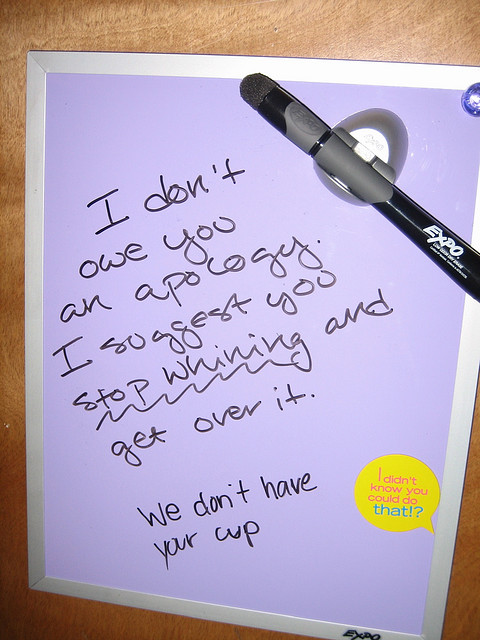
I Demand An Apology
I enjoyed David Mitchell’s article in the Guardian about the demanding of apologies and I laughed at the story he told about his parents.
It reminds me of being made to apologise as a child. I remember a specific occasion when my parents were furious with me for some reason. And I was furious with them. It was a standoff. They were demanding an apology or else, as I recall it, basically nothing was to be allowed in future: food, sleep, not eating all my food, not immediately going to sleep, going outside, being allowed inside, contact with the cat – all banned. It was a massive campaign of sanctions and I was livid. And so I apologised. And then my mother said: “Say it like you mean it.”
“But I don’t mean it!” I screamed, trying to reason with her.
“Well it doesn’t count if you don’t mean it.”
Haven’t we all been there? Backed into a corner by our unreasonable demands, unwilling to back down and admit we got it wrong. Recently my son decided that he was not going to eat the meal that I had cooked. I said that if he finished the tiny bit of potato on his plate then he could have a ham sandwich. Stand off. He ate microscopic pieces of potato, comically gagging for effect then said that he could not any more because it was “disgusting”.
“You are not getting down from this table unless you finish that potato”, I heard myself say, even as my sensible self screamed, “WTF are you doing? You KNOW how stubborn he is, he will be here till next Tuesday”.
Besides the fact that I have always been convinced that the best way to deal with fussy eaters is to not make a fuss about them. Don’t turn meal times into a battleground.
I feel the same way about making small children apologise. Mine were never made to apologise, as I always felt that a sincere apology was worth more than one recited by rote. This is slightly controversial, I have found, as many feel that apologising is learned behaviour and kids just have to say the word, they will eventually learn what it means.
I think all that teaches them is how to appease someone, even if you are not sorry for the hurt you have caused.
My parenting philosophy has always been to treat the kids with respect, to use no force (other than in extreme situations when the child’s life in in danger) and not to utter any kind of ultimatum.
All very well in theory, but we all know how much the little beggers can try our patience and lead us far from our ideals.
“If you don’t do X then you are not going to Y” – does this work with your kids? With my daughter it might, with my son it often falls on deaf ears. He is stubborn, almost as stubborn as I am (funny that) so I try not to get into a battle of wills with him.
Over the years, I have found, “Once we have done X, we can go to Y” much more effective. A small change, but it presents the demand in a positive light.
Now my children are older, I can report that the not forcing them to apologise when they were toddlers did not lead to being unable to apologise now. They both have a well-developed sense of empathy, and offer (mostly) sincere apologies when they offend or hurt someone.
Do you make your children apologise?




2 Comments
Robyn
I don’t *make* Adam apologize. I do ask him to and if he does, great. If he doesn’t, I don’t make a big deal out of it. At 2.9 years he really is too young to know what ‘I’m sorry’ really means.
He does, however, respond well to, ‘if you don’t do X you won’t get Y’ or ‘you can have X after you do Y’. I think I’m probably lucky in that! :O)
Lynn
Yes, that is it. If you try to make him say sorry, then you risk getting into a situation that neither can back down from.
I am biting my tongue on your last comment and resisting telling you just to wait… ;-))